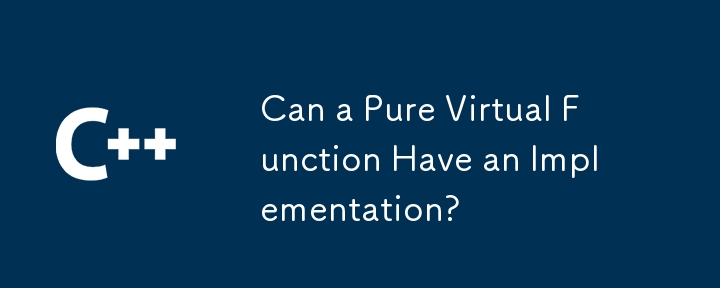

Implementation for Pure Virtual Functions
Despite the common understanding that pure virtual functions lack implementations, certain situations allow for an implementation within the base class. Consider the following code:
class A {
public:
virtual void f() = 0;
};
void A::f() {
cout << "Test" << endl;
}While this code appears to violate the principle of pure virtual functions, it is in fact valid. However, this raises two important questions:
1. Is the Code Valid?
Yes, the code is valid syntax. The base class A can define an implementation for its pure virtual function f(), even though derived classes must also provide their own implementations.
2. Purpose of Pure Virtual Function with Implementation:
There are several potential reasons to define an implementation for a pure virtual function:
It's important to note that while this language feature is allowed, it is not commonly used. However, it can be a useful tool in certain scenarios where a default or shared implementation is desired.
The above is the detailed content of Can a Pure Virtual Function Have an Implementation?. For more information, please follow other related articles on the PHP Chinese website!
 What software is Penguin?
What software is Penguin?
 How to use a few thousand to make hundreds of thousands in the currency circle
How to use a few thousand to make hundreds of thousands in the currency circle
 Introduction to hard disk performance indicators
Introduction to hard disk performance indicators
 Causes and solutions of runtime errors
Causes and solutions of runtime errors
 Standby shortcut key
Standby shortcut key
 The latest price of fil currency
The latest price of fil currency
 How to view Tomcat source code
How to view Tomcat source code
 WeChat restore chat history
WeChat restore chat history




